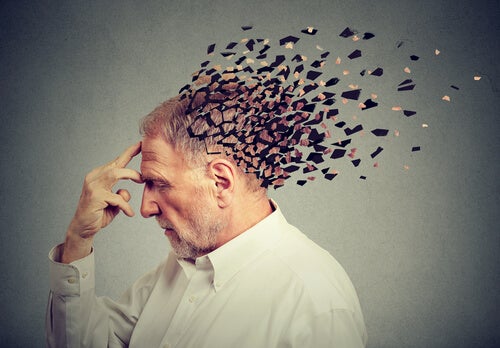The Meaning of Subjective Memory Complaints

People tend to worry more and more about cognitive functions as they get older. There’s a particular concern for future memory loss. Haven’t you ever thought: “My memory isn’t what it used to be?” Realizing your memory is deficient is precisely what subjective memory complaints (SMCs) are about.
Memory is a function people test daily and tends to be frequently questioned due to this, especially when you begin to forget.
According to Peña (2015), the concept behind SMC involves several factors:
- A person’s judgment of their memory performance.
- The subjectivity of said performance.
- Also, the object of the complaint: the daily forgetfulness.
This means that people, in general, know their memory capacity and, thus, can easily detect a decrease in their performance.

Are subjective memory complaints a type of mild cognitive impairment?
For some authors, such as Reid & Maclullich (2006), mild cognitive impairment (MCI) has clinical significance due to its relationship with memory impairment. Also, because it assumes the risk of subsequent cognitive impairment and serves as a measure of the type of personality and depression.
In general, in order for these complaints to meet a diagnostic criterion, family members must corroborate and express them to a treating physician.
Currently, subjective memory complaints are part of the diagnostic criteria for mild neurocognitive disorder (mNCD), according to Petersen et al. (1999), as well as for minor neurocognitive disorder, as per the DSM-5.
Diagnostic criteria for mNCD (Petersen et al., 1999)
- Memory loss, referred by the patient or other reliable informant.
- Lower or below-average memory capacity for their age.
- Normal general cognition.
- Normalcy in their daily activities.
- Finally, an absence of diagnostic criteria for dementia.
Diagnostic criteria of mNCD (according to the DSM-5)
- Firstly, evidence of modest cognitive decline from a previous level of higher performance in one or more of one of the cognitive domains.
- Cognitive deficits are insufficient to interfere with a person’s independence and, thus, may require more effort, compensatory strategies, or accommodation in order to maintain their independence.
- Cognitive deficits don’t occur exclusively in the context of delirium.
- Finally, cognitive deficits aren’t primarily attributable to the presence of other mental disorders.
This hasn’t been the first time that the existence of SMC has been taken into account. In 1962, Kral introduced this concept by referring to “benign senescent forgetfulness”. The difficulty in remembering specific aspects of an episode that could normally be remembered later highlighted it.
Focusing on the present, several studies relate subjective memory complaints and cognitive impairment. Some of them suggest that people with subjective memory complaints harbor the neuropathology of Alzheimer’s disease in their brains, even before they’re aware of any symptoms of cognitive deterioration (Kryscio et al., 2014).

Conclusion on subjective memory complaints
In short, one could say there’s no consensus on whether subjective memory complaints and mNCD are related. However, the former may be an early symptom of the deterioration in the latter.
In any case, it’s always better to consult a professional if you perceive symptoms that could be related to mild cognitive impairment.
Primary care professionals can detect possible cognitive impairment with various screening tests. Furthermore, some of the tests used for early detection are:
- 35-point Lobo’s Mini Cognitive Test (Lob0 et al., 1999).
- Mini-Mental State Examination in cognitive impairment screening (Carnero, 2002).
- Short Cognitive Performance Test or “Syndrom Kurztest” (Erzigkeit, 1989).
- Buschke’s Memory Alteration Test (Peña-Casanova et al., 2004).
Finally, you must keep in mind that, in order to avoid confusion or errors, all these tests must be conducted by trained professionals, as it’s the only way to get a reliable diagnosis.
People tend to worry more and more about cognitive functions as they get older. There’s a particular concern for future memory loss. Haven’t you ever thought: “My memory isn’t what it used to be?” Realizing your memory is deficient is precisely what subjective memory complaints (SMCs) are about.
Memory is a function people test daily and tends to be frequently questioned due to this, especially when you begin to forget.
According to Peña (2015), the concept behind SMC involves several factors:
- A person’s judgment of their memory performance.
- The subjectivity of said performance.
- Also, the object of the complaint: the daily forgetfulness.
This means that people, in general, know their memory capacity and, thus, can easily detect a decrease in their performance.

Are subjective memory complaints a type of mild cognitive impairment?
For some authors, such as Reid & Maclullich (2006), mild cognitive impairment (MCI) has clinical significance due to its relationship with memory impairment. Also, because it assumes the risk of subsequent cognitive impairment and serves as a measure of the type of personality and depression.
In general, in order for these complaints to meet a diagnostic criterion, family members must corroborate and express them to a treating physician.
Currently, subjective memory complaints are part of the diagnostic criteria for mild neurocognitive disorder (mNCD), according to Petersen et al. (1999), as well as for minor neurocognitive disorder, as per the DSM-5.
Diagnostic criteria for mNCD (Petersen et al., 1999)
- Memory loss, referred by the patient or other reliable informant.
- Lower or below-average memory capacity for their age.
- Normal general cognition.
- Normalcy in their daily activities.
- Finally, an absence of diagnostic criteria for dementia.
Diagnostic criteria of mNCD (according to the DSM-5)
- Firstly, evidence of modest cognitive decline from a previous level of higher performance in one or more of one of the cognitive domains.
- Cognitive deficits are insufficient to interfere with a person’s independence and, thus, may require more effort, compensatory strategies, or accommodation in order to maintain their independence.
- Cognitive deficits don’t occur exclusively in the context of delirium.
- Finally, cognitive deficits aren’t primarily attributable to the presence of other mental disorders.
This hasn’t been the first time that the existence of SMC has been taken into account. In 1962, Kral introduced this concept by referring to “benign senescent forgetfulness”. The difficulty in remembering specific aspects of an episode that could normally be remembered later highlighted it.
Focusing on the present, several studies relate subjective memory complaints and cognitive impairment. Some of them suggest that people with subjective memory complaints harbor the neuropathology of Alzheimer’s disease in their brains, even before they’re aware of any symptoms of cognitive deterioration (Kryscio et al., 2014).

Conclusion on subjective memory complaints
In short, one could say there’s no consensus on whether subjective memory complaints and mNCD are related. However, the former may be an early symptom of the deterioration in the latter.
In any case, it’s always better to consult a professional if you perceive symptoms that could be related to mild cognitive impairment.
Primary care professionals can detect possible cognitive impairment with various screening tests. Furthermore, some of the tests used for early detection are:
- 35-point Lobo’s Mini Cognitive Test (Lob0 et al., 1999).
- Mini-Mental State Examination in cognitive impairment screening (Carnero, 2002).
- Short Cognitive Performance Test or “Syndrom Kurztest” (Erzigkeit, 1989).
- Buschke’s Memory Alteration Test (Peña-Casanova et al., 2004).
Finally, you must keep in mind that, in order to avoid confusion or errors, all these tests must be conducted by trained professionals, as it’s the only way to get a reliable diagnosis.
All cited sources were thoroughly reviewed by our team to ensure their quality, reliability, currency, and validity. The bibliography of this article was considered reliable and of academic or scientific accuracy.
- Casanova Sotolongo, P., Casanova Carrillo, P., & Casanova Carrillo, C. (2004). Deterioro cognitivo en la tercera edad. Revista cubana de medicina general integral, 20(5-6), 0-0.
- de León, J. M. R. S., & Pérez, I. M. (2011). Fluidez verbal escrita en el envejecimiento normal con quejas subjetivas de memoria y en el deterioro cognitivo leve. anales de psicología, 27(2), 360.
- García-Sevilla, J., Fernández, P. J., Fuentes, L. J., López, J. J., & Moreno, M. J. (2014). Estudio comparativo de dos programas de entrenamiento de la memoria en personas mayores con quejas subjetivas de memoria: un análisis preliminar. Anales de psicología, 30(1), 337-345.
- Kryscio, R. J., Abner, E. L., Cooper, G. E., Fardo, D. W., Jicha, G. A., Nelson, P. T., … & Schmitt, F. A. (2014). Self-reported memory complaints: implications from a longitudinal cohort with autopsies. Neurology, 83(15), 1359-1365.
- Peña, M. M. (2015). Quejas subjetivas de memoria en el envejecimiento y en adultos jóvenes: variables implicadas(Doctoral dissertation, Universidad Complutense de Madrid).
This text is provided for informational purposes only and does not replace consultation with a professional. If in doubt, consult your specialist.







